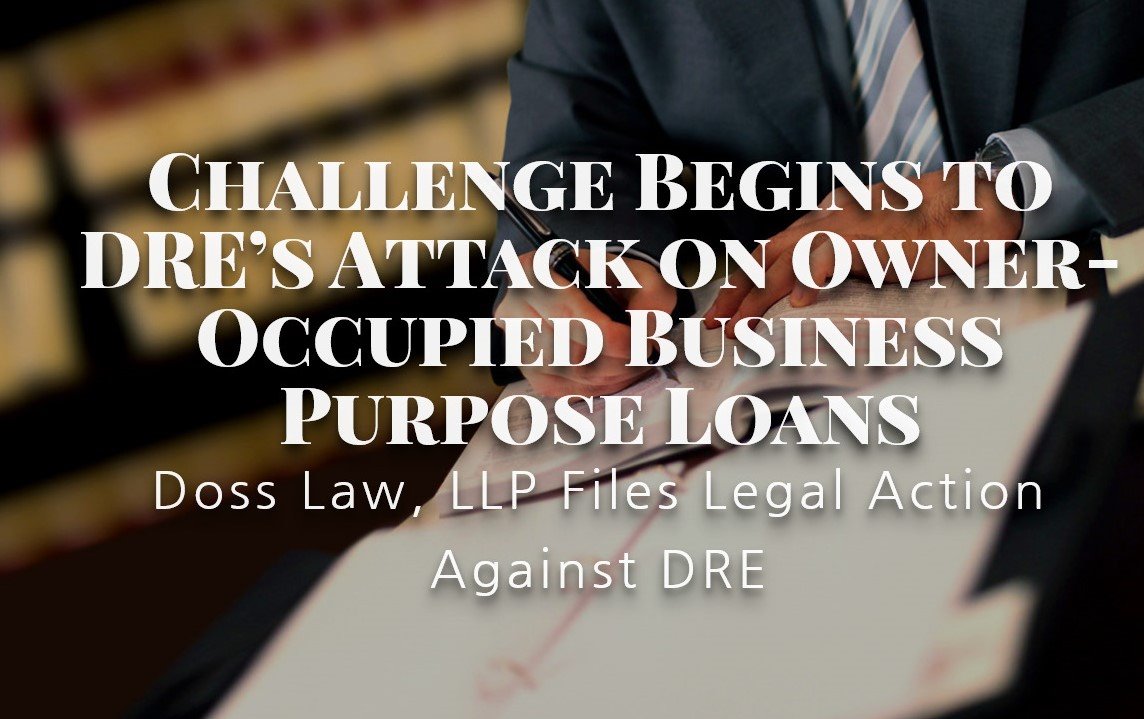Financial Code Sections 4970-4978.8, California’s High Cost Mortgage Law, became law in 2001. It applies to “covered loans,” meaning consumer loans under the Fannie Mae conforming loan limit secured by borrowers’ principal dwellings where one of two thresholds are crossed: (a) the APR exceeds by more than 8% the comparable T-Bill rate or (b) the counted points and fees exceed 6% of the loan amount. The statute says it applies to “consumer loans,” but the statutory series does not contain its own definition of “consumer loans.” However, in no less than 8 other places in the same Financial Code “consumer loan” and “consumer credit” are defined as loans for “personal, family or household purposes, “which excludes business purpose loans. California High Cost Law also contains many references to Federal High Cost Law in Regulation Z (part of Dodd-Frank), which also defines a “consumer loan” as a loan for personal, family or household purposes.
For nearly 20 years the industry operated under the belief that “consumer loans” subject to California High Cost excluded business purpose owner-occupied loans in the same way federal laws worked. Never before has the DRE brought this position up in audits. However, in 2017 the DRE filed an disciplinary Accusation against KS Capital for violation of 4970. KS had made a garden variety business purpose loan to an entrepreneur secured by her residence. The auditor explicitly found that that it was a business purpose loan. Nevertheless the DRE took the position in its Accusation against KS and at a February 5, 2019 trial at the Office of Administrative Hearings in Los Angeles, that 4970 applied to business purpose loans. OAH Judge Laurie R. Pearlman, sided with the DRE saying:
“Financial Code section 18005 defines “consumer loan” as a loan made to an individual in which the money ‘is primarily used for personal, family or householder purposes.’ While B.W.’s loan was for a business purpose, it was secured by her principle (sic) dwelling. Accordingly, complainant’s [DRE] contention, that this transaction is governed by laws meant to shield consumers from losing their homes, is a reasonable interpretation of these laws, and her [Commissioner’s] view must prevail.”
In effect, Judge Pearlman allowed the DRE to disregard the statutory definition of “consumer loan” and replace it with what the DRE thinks the law should say but doesn’t. The DRE’s actions usurp the function of our Legislature who has the exclusive right to make laws. On April 22, 2019, Daniel Sandri, Acting Real Estate Commissioner for the DRE, adopted Judge Pearlman’s decision. Attempts to reason with the DRE have been unsuccessful.
On May 30, 2019 Doss Law, LLP filed, on behalf of KS Capital, a Petition for Writ of Mandamus against the DRE in the Los Angeles Superior Court. We will ask the Superior Court to overturn the DRE’s position and to confirm the industry’s position that 4970 only applies to loans for personal, family or household purposes. A copy of the Petition and the OAH/DRE decision can be found at this link:
We believe the California Legislature, like Congress, made a conscious decision to allow entrepreneurs to use the equity in their homes to finance new and existing businesses to foster economic growth and jobs in our State without the strict requirements that apply to consumer home loans. That intent was confirmed by the Legislature’s recent passage of a business Truth-in-Lending Law, that exempted real estate loans.
We will provide updates as the case progresses toward a hearing. In the meantime, you may want to reconsider business purpose loans under the Fannie Mae conforming loan limit where APR will cross the 8 over T-Bill threshold or where the counted points and fees will exceed 6.


















